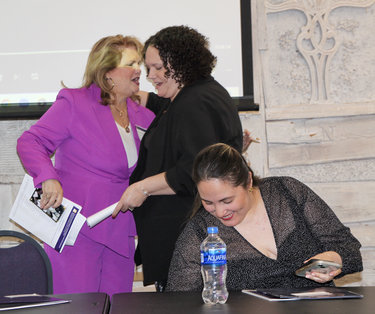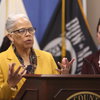At UAlbany symposium, women urged to ‘use collective voices to stand up for what is right’
The Enterprise — Melissa Hale-Spencer
Karen Carpenter Palumbo, board president of the Center for Women in Government and Civil Society, at left, embraces Johanne Morne, executive deputy commissioner of the state’s health department, after Morne gave her keynote speech. Julissa Gutierrez, the state’s chief diversity officer, seated, introduced Morne.
Assembly Hall was packed with women on Thursday morning — women of different ages and different colors who applauded as one. Shouts of “Amen!” and warm murmurs of “Mmmm-hmm” greeted the speakers.
Government leaders and leaders of community groups — all women — spoke about how to respond to the current crisis.
Karen Carpenter Palumbo, board president of the Center for Women in Government and Civil Society, said 275 people attended the University at Albany conference titled “Reviving our Collective Power: Reclaiming our Rights.”
Attorney General Letitia James, addressing the crowd virtually, said, “The actions of the Trump administration are not only detrimental to our state’s economy and the daily regional governments to serve their constituents, but fundamentally contradict our shared values as New Yorkers and pose catastrophic risk to our state … They’re matters of right and wrong.”
James concluded, “Let us stand together; let us stand up and defend democracy.”
James is being investigated by the Trump administration for her real-estate transactions.
“Keep following our attorney general,” Palumbo advised the crowd, “because she’s under a personal and professional attack by Washington. And so we need to provide that support. She’s leading some of our efforts to make sure that we have everything that she said, that we’re defending against, all that we will speak about today.”
Julissa Gutierrez, the state’s chief diversity officer, who spoke next, said of the “rising attack on our fundamental rights”: “It’s painful and it’s personal.”
She went on to say, “Our strength lies in leaning in and not retreating …. None of this work can be done alone."
She repeated the catchphrase, “We need to connect before we collect,” and stressed, “Fear is not a fact.”
The keynote speaker, Johanne Morne, executive deputy commissioner of the state’s health department, said she was asked if she wasn’t scared to speak at the symposium.
“No, this is the exact time we need to speak on diversity, equity, and inclusion,” she said to applause.
Although challenges in government and public health are not new, Morne said, the current challenge “feels significantly different and overwhelming.”
While people complain about taxes in New York, Morne said, to applause, that she was proud to live in a state that works to protect people who are at risk. She was applauded again for noting Governor Kathy Hochul’s protection of reproductive health.
Morne urged the crowd of women to “use collective voices to stand up for what is right.” She praised the more than 400 colleges, including the University at Albany, that found common ground to stand on, opposing the Trump administration’s assault on higher education.
“We have to lean in … reclaim our hope … center and revitalize ourselves,” said Morne.
While many are familiar with the story of Helen Keller’s childhood, coping with her loss of sight and hearing, Morne stressed how, as an adult, Keller fought for civil liberties and was a founding member of the American Civil Liberties Union.
Morne went on to quote Keller: I cannot do everything, but I can do something. I must not fail to do the something that I can do.
Morne concluded with calls to action, urging the women in the room to find spaces and people to lean into; to, in the next 24 hours, “call that friend or loved one that you’ve been meaning to call”; to “find five minutes to sit in silence and think of that single thing that you know has always in the past refreshed you and restored you.”
To do the work of caring for others, Morne said, you have to care for yourselves.
“This, in fact, is how we counter the chaos and remain focused,” said Morne. “It’s how we rekindle the virtues that are essential during these historical times — the virtues of resilience, determination, understanding, and compassion.”
“Collective power”
A panel featuring four government leaders opened with moderator Walter Thorne, publisher of the Albany Business Review, quoting Ruth Bader Ginsburg: Women belong in all places where decisions are being made.
Each of the panelists began by describing how, in the last 102 days, their work has been hurt by the Trump administration.
Marion Porterfield, Schenectady’s council president, said she has been hearing from a lot of her constituents concerned about losing benefits or fearful of Immigration and Customs Enforcement.
“Absolute power corrupts absolutely,” she said. “So we have to use our collective power to address what is going on.”
Susan Pedo, an Albany County legislator who lectures at the University at Albany, said students bounced back from the pandemic and were engaged but now “these same students are so distracted by what’s happening at the federal administration — some of them because of an immediate fear that they could be removed, others out of concern for their friends, and others for any of the myriad reasons the federal government has thrown at all of us to be afraid.”
However, Pedo said, students are channeling their fears into action, making statements and attending marches and rallies.
Kathy Sheehan, Albany’s mayor, said, “There are grants that have been granted and then pulled back and then granted again and then pulled back.”
Her goal is to be prepared for the unpredictable and to “build more and more allies” so that, for example, homeless people and hungry people can be provided for.
“We had developed a food pantry program where people were treated with dignity. They were able to go in and shop,” said Sheehan, noting they could get healthy and culturally appropriate food. “All of that has been upended.”
Sheehan also said, “The city of Albany has been a refugee resettlement city for decades. We have immigrants from all over the world living in our community, many of them who experienced incredible trauma in war-torn countries.”
She said the city, the school district, and volunteers have all worked to provide “people with the opportunity to access the resources that they need and be on a path to be able to support themselves and their families and move forward in their future.”
Later, Sheehan called immigrants “the canary in the coal mine,” prophesizing that, if their rights are trampled by the Trump administration, no one will be safe.
She spoke of refugees who were “promised 90 days of assistance and on January 21st they were told, 'You are getting no assistance.'”
Sheehan said, “We expected that there would be a complete shutdown in new refugees coming over, but we didn’t expect the cruelty and the broken promise to those who were already here.”
Barbara Guinn, as commissioner for the state’s Office for Temporary and Disability Assistance, oversees benefit programs for food, energy, and housing. “We build up and support lower income households so that they can become financially secure,” said Guinn.
She views the Trump initiatives “as a war on the poor.” She went on, “And to do that for the purpose of supporting additional tax breaks to people who are doing extremely well is difficult to comprehend. And it’s something that we all need to work to say it’s not OK.”
Guinn also said, “People are very anxious,” including staff who worry about losing their jobs.
Watching the news yesterday, Guinn said, the president was commenting on the effects of tariffs, saying, maybe the children will have two dolls for Christmas instead of 30 dolls.
“I don’t know whose child gets 30 dolls at Christmas,” Guinn said, “but again just not understanding what’s the importance of the programs that the government delivers to keep people economically secure.”
She went on, “It’s not about dolls; it’s about food and they’re trying to take the food away.”
Guinn also said that New York “has done a great job planning access to Medicaid …. Again, it’s not about dolls; it’s about health and having access to health insurance.”
All of the panelists spoke of the “trickle-down” effect from the federal government, but not in the way that phrase was first used by Ronald Reagan with his trickle-down policy, giving tax breaks to the wealthy with the supposition it would raise everyone’s standard of living.
Rather, the panelists used the phrase to describe the harm being done by current federal cuts and policies.
For example, with the elimination of federal housing subsidies, known as Section 8, Sheehan said, “Millions and millions of dollars that will now no longer be paid to landlords, to property owners, investors in our community and in communities throughout the country. That is going to have a significant impact on real estate in all of those markets.”
Pedo said Albany County has started a revolving loan fund to address both the housing and the contractor gap as housing initiatives are now called into question.
Porterfield said Schenectady had intentionally used much of its federal American Rescue Plan Act funding on community-based organizations and, with those ARPA funds being taken back, organizations that help people with food, housing, and children’s programs are now in jeopardy.
The panelists also discussed diversity, equity, and inclusion with several saying they no longer used the acronym DEI since it has become such a flashpoint.
Porterfield, a Black woman, said there’s a misconception that DEI applies only to people of color. “You may think it only means me … but it means you, too,” she said.
“White men have benefited from affirmative action for centuries,” said Sheehan.
She gave examples from her own experience: Women were not allowed in the Fort Orange Club where political decisions were made; she couldn’t join young male associates in her law firm on a fishing trip because “guys would pee off the boat”; currently, at City Hall, she has to use a bathroom in the basement or the mezzanine, which has no elevator access.
Asked by Moderator Thorne if the United States is in a constitutional crisis, Guinn said, “We are certainly in a crisis … This is not normal …. They are trying to retain power through methods of intimidation and fear.”
Pedo said, “I don’t think there’s any denying we’re in a constitutional crisis.”
She said that the last time Trump was in office, the Constitution held. “They learned from that,” she said of the Trump administration.
“When they came back in January, the assault on the Constitution and where possible weaknesses to be exploited existed, they went right at those really hard and really fast. Will the Constitution uphold? Will we continue to be a government of laws? It’s yet to be seen.”
Pedo’s hope is that the mid-term elections will make a difference.
“And that will be the point at which we’ll see: Does the constitution hold? Are we a government of laws or are we much more dependent on good behavior for the sustaining of our democratic principles?”
“Our Constitution is under attack," said Porterfield.
She noted, “We all have different lived experiences” and urged putting aside differences to work together.
Thorne once again quoted Ruth Bader Ginsburg: Fight for the things that you care about. But do it in a way that will lead others to join you.
Sheehan said, “The abolitionist movement started in people’s living rooms” and urged listeners to invite people into their living rooms now to develop strategies to fight for rights.
“It’s not just people who work in government,” said Sheehan of who should be active. “It’s all of us in civil society.”
Porterfield said the Civil Rights movement provides a road map. She spoke of the rights her grandparents and great-grandparents had fought for. “Somewhere along the line, we almost forgot,” she said. “And this is reminding us that we fought the fight, but we have to continue …. I sit where I sit, I do what I do because of those that came before me and did the work.”
“Amen!” came a call from the crowd.
“You fight for what’s right and you just don’t fight for yourself,” Porterfield went on. “You fight for the other person as well because someday you could be the other person.”
“Amen!” came a chorus from the crowd.
Thorne said there are many silent men — with mothers and daughters and grandmothers — who “really just don’t know what to do. So I would encourage us as a room rather than call them out, call them in. Because you’d be surprised how many men might be wanting to respond to something but in their own fragility don’t know how to do so.”
Thorne, who read questions that audience members had penned on cards, said he saved an incendiary topic for last. One question was on how to include the Jewish community in DEI and another was asking how the United States and New York should respond to the genocide of Palestinians and the current rollback of American rights.
“Using antisemitism as a reason for cutting funding to colleges is an abomination,” said Sheehan to applause.
She also said she had watched a documentary on the horrific effects of the Oct. 7 Hamas terrorist attack but imagined an equally horrific documentary could be made on what’s happening to children in Gaza.
She advised lowering the temperature, noted that social media keeps everyone in their own bubble, and concluded, “We are more united than divided.”
Thorne opined that, if 100 Democrats and 100 Republicans were in a room, 80 percent of them would agree on the same values.
“We the People need to look in the mirror,” he said.
Finally, Thorne asked, “Are we using human decency as our measuring stick? … Are we talking to each other? … Are we listening to each other?”



